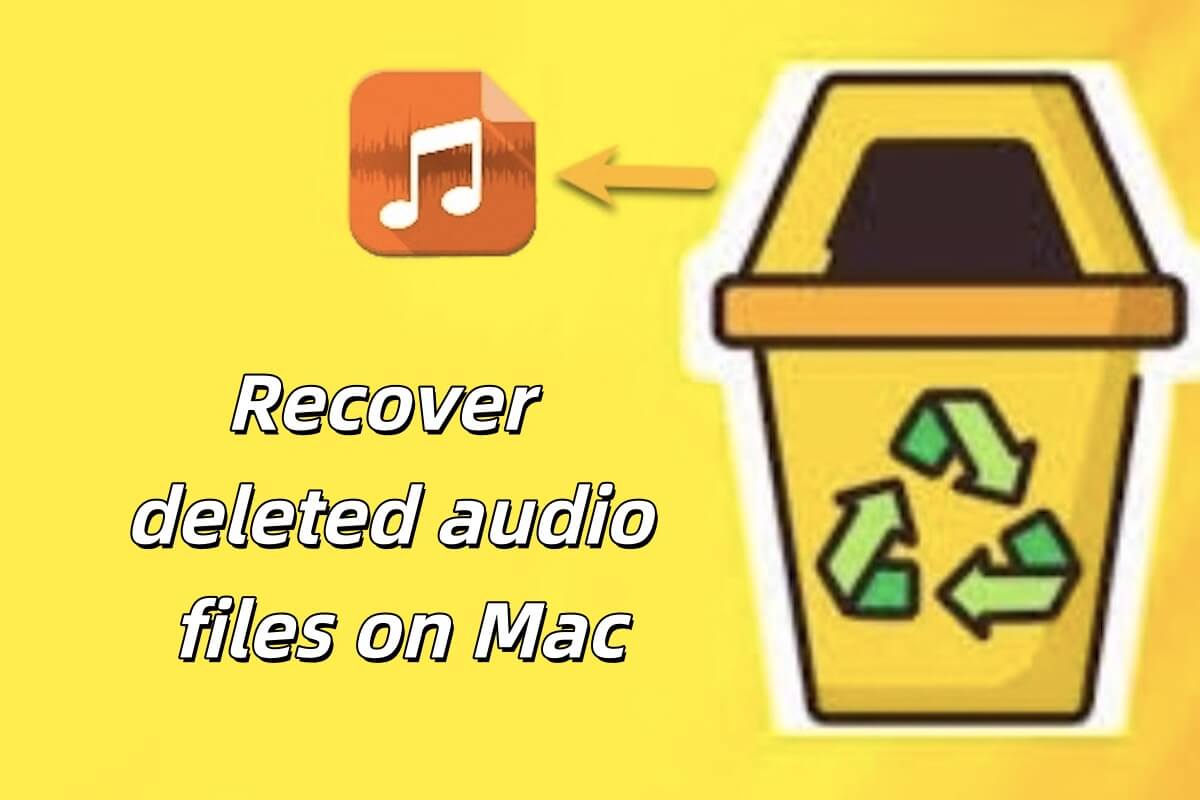Audio files refer to digital files that store sound information. These files can contain music, voice recordings, sound effects, etc. Common audio file formats include MP3, WAV, FLAC, and AAC. Audio files can be played on various devices, including computers, phones, and audio players.
If your audio files were deleted or lost, you can find a proper way from this post to recover deleted audio files on your Mac. We have listed four ways to help you recover your deleted files, follow us to find out.
Spread this post to help more people recover their deleted audio files.
Can I recover deleted audio files on Mac?
Although you cherish your audio files very much, you inevitably lose your audio files. Here are the situations you may be in:
- You could accidentally delete audio files without knowing it, especially when freeing up your disk space.
- The device storing the audio file is damaged and the audio file cannot be accessed.
- Format unbacked up hard disk /SD card/memory card containing audio files.
- If the application program or software where the audio file resides fails, the file may be deleted by mistake or lost.
Whatever the scenario you are in, there are many different methods to recover your audio files.
Reddit discussions on how to recover deleted audio files on Mac
Many people like you are confused about how to recover deleted or lost audio files, so they seek various methods on the web. For example, there is the following post on Reddit about recovering audio files.
Recovering Lost Audio Files
by u/professionalhousecat in Logic_Studio
The user posted on Reddit that he accidentally deleted all the audio files. He found that he could not recover his audio files in the Trash, so he manually dragged the audio files back to the Audio Files folder in the Logic project, the recovery was also unsuccessful because his audio files were damaged.
We have listed several ways to help you recover deleted audio files on Mac. Even if your deleted audio files are not in the Trash, you can recover your files by other methods. Read on to find out what works best for you!
How do I recover deleted audio files on my Mac?
You can recover deleted files on a Mac, depending on how long they were deleted and whether they were overwritten with new data. There are 4 ways you can try to recover your deleted audio files on Mac.
Recover deleted audio files on Mac from the Trash
Recovering deleted audio files from the Trash is the easiest method. If you moved audio files to the Trash and did not empty them, in this case, you can try to find and recover the deleted audio files on your Mac in the Trash.
Open your Trash and look for your deleted audio files in the Trash. If you find your deleted audio files here, right-click Put Back to restore them to their original location. 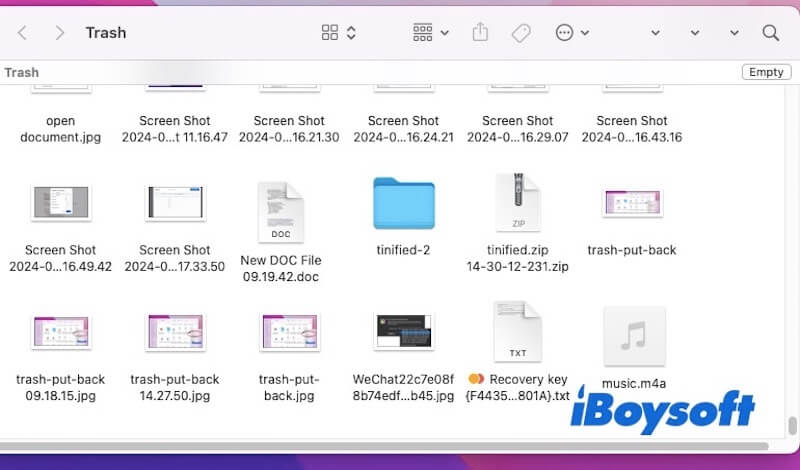
However, we should remind you that even if you don't empty your Trash, Mac will automatically delete items within your Trash within 30 days. Therefore, if you want to recover your audio files anytime, please use the following method.
Recover deleted audio files on Mac with iBoysoft Data Recovery
iBoysoft Data Recovery is a secure data recovery software with a high recovery success rate. It supports various storage devices, including hard disks, SSDS, SD cards, and USB drives, and is suitable for data loss scenarios.
In addition, iBoysoft Data Recovery has a simple interface and clear operation process with a few simple steps to recover data. Whether you have emptied your audio files or are automatically deleted in the Trash after 30 days, you can recover them easily with iBoysoft Data Recovery.
Note: You'd better prepare an external hard drive to store the recovered audio files, which can prevent audio files from being written to the original device again, thus preventing data from being accidentally overwritten and ensuring that the recovered data is properly stored.
Follow the steps to recover deleted audio files:
- Free download and install iBoysoft Data Recovery on your Mac.
- Select the disk where the deleted audio files are located, then click Search for Lost Data to scan disks.
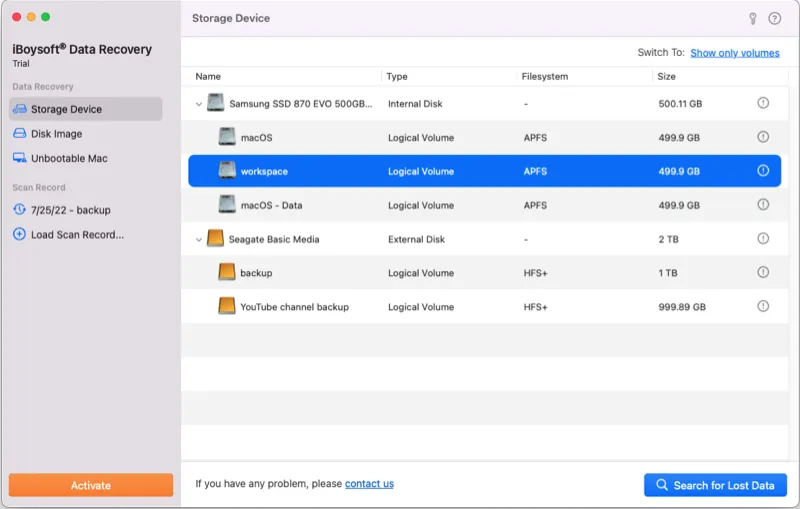
- Wait for the scanning to finish.
- After scanning, preview the audio files you want to recover and select them by clicking the Recover button. Recover deleted audio files on Mac to the external hard drive you prepare.
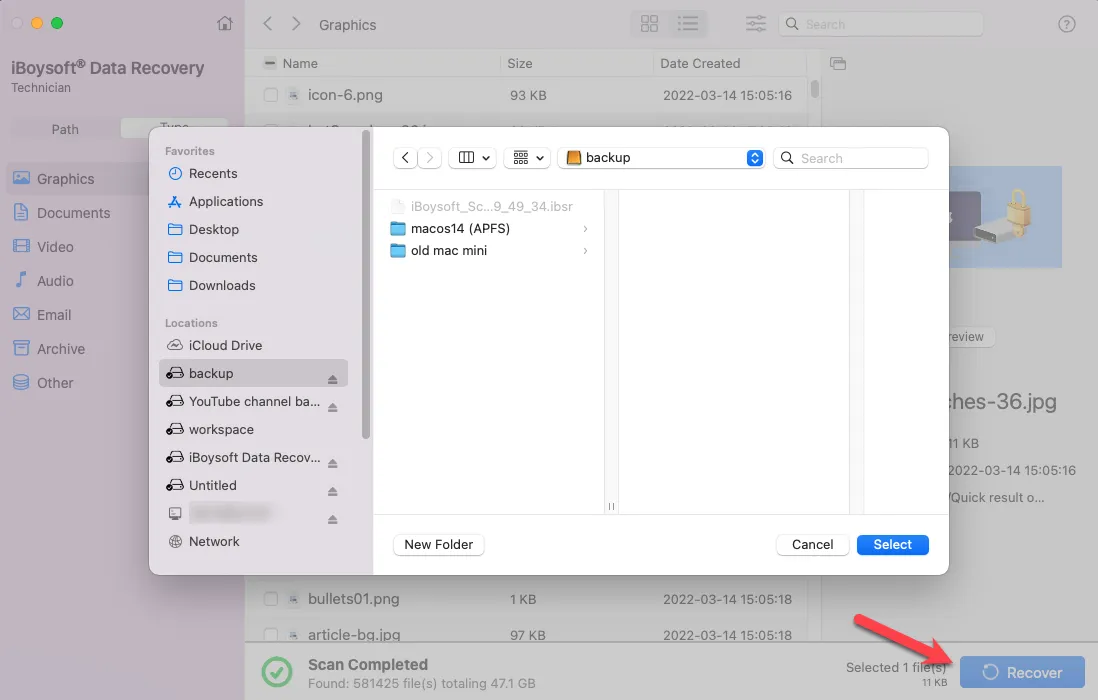
Share this tool with your friends if you find it helpful.
Recover deleted audio files on Mac via Time Machine Backup
Time Machine is a backup tool that comes with macOS and can help you back up your data regularly. It can automatically back up the entire system, including files, applications, system Settings, etc.
Therefore, if you use the Time Machine backup system before deleting audio files, you can try to recover deleted audio files on Mac through Time Machine.
Here is how to recover deleted audio files on Mac via Time Machine Backup:
- Ensure that the external hard drive or storage device where your Time Machine backups are stored is connected to your Mac.
- Open Time Machine by Clicking the Time Machine icon in the menu bar and selecting Enter Time Machine.
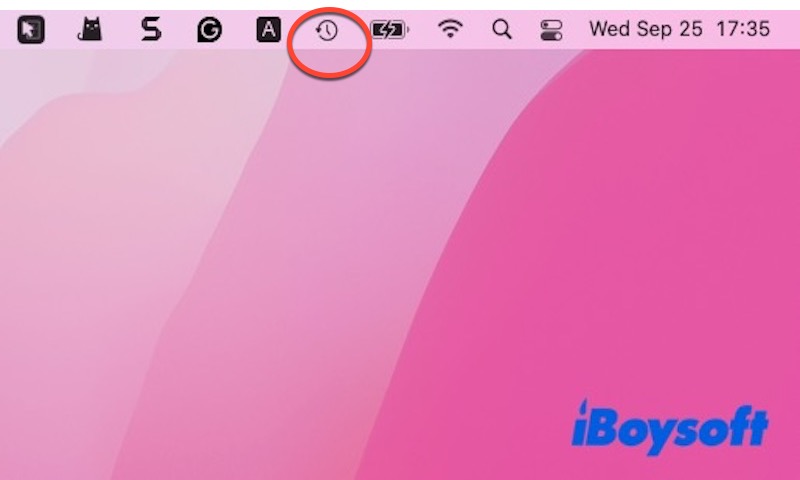
- Once in Time Machine, you'll see a timeline on the right side of your screen. Navigate to the folder where the deleted audio files were originally stored (e.g., Desktop, Documents, Music folder). Then use the timeline to scroll back to a date before the files were deleted.
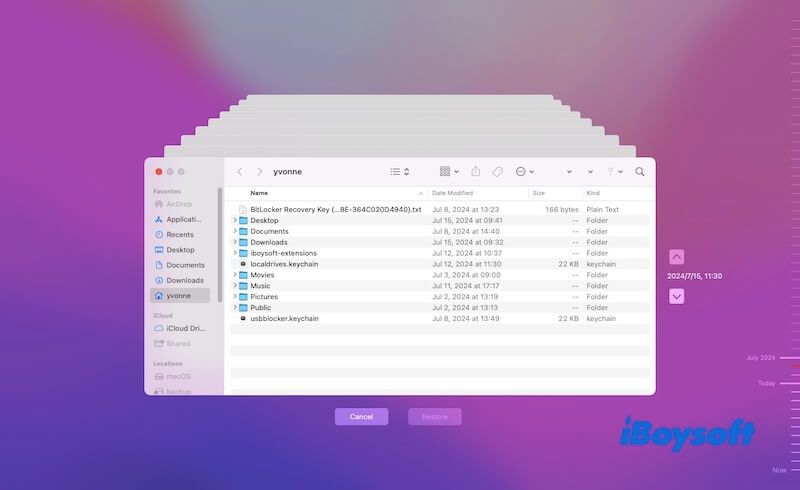
- After locating the deleted audio files, select them, and click the Restore button at the bottom of the window. The files will be restored to their original location.
- After recovery, return to the folder to ensure deleted audio files have been successfully recovered.
Recover deleted audio files on Mac from the Cloud
Recover from iCloud Drive
iCloud automatically syncs files to the cloud, especially in the Desktop and Documents folders, that's why you can recover deleted files from iCloud on your Mac. That way, if you delete a local file by mistake, or if a local file gets corrupted, you can restore it to the previous version from iCloud.
If your audio files were stored in iCloud Drive, you can retrieve deleted files within 30 days. Here are how to do it.
- Find iCloud Drive in Finder and open it.
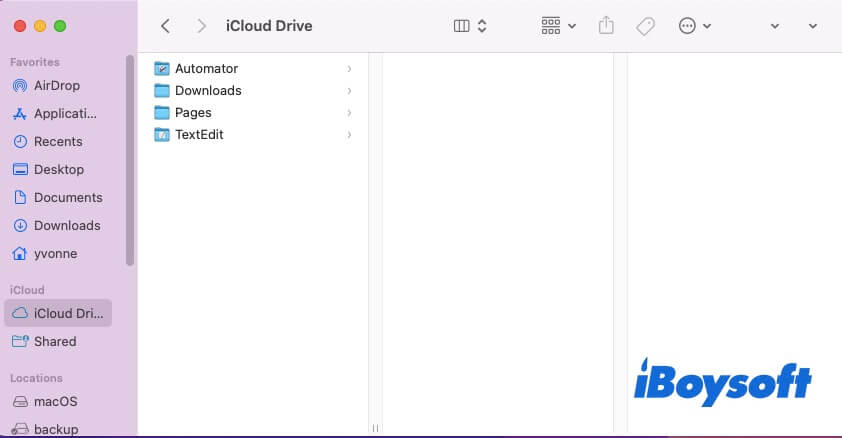
- Once in iCloud Drive, find out if you can find the deleted audio files.
- Recover your audio files by going to iCloud.com.
- Sign in with your Apple ID, and click Account Settings.
- Scroll down and find the Recover Files option at the bottom of the page.
- Check whether the deleted audio file can be recovered. If you find the desired file, check it and click Recover.
Recover via Cloud Storage Service
If you use a cloud storage service to back up your audio files, log in to the service (such as Google Drive or Dropbox). Check the trash or Deleted Files folder to see if you can find the deleted audio files. If you find the files you need, select them and use the restore function. The files will reappear in your cloud or sync back to your Mac.
Conclusion
This article provides various methods to recover deleted audio files on Mac. If you have the misfortune to delete or lose audio files on Mac, you can choose a solution according to your situation.
However, among the above methods, using iBoysoft Data Recovery is the best because it has no time limitations and you can recover your deleted audio files anytime.
Share this article if you have successfully recovered your audio files.
